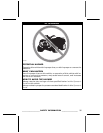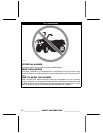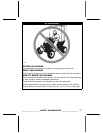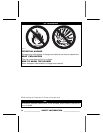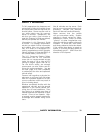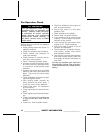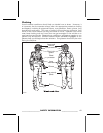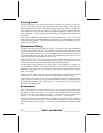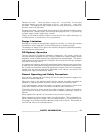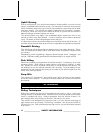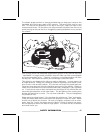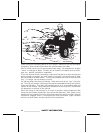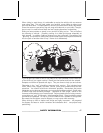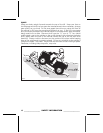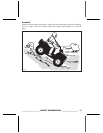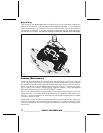Observe the rule... “what you take in, carry out”. Do not litter. Do not start
campfires unless you have permission to do so... and then only... away from
dry areas. The hazards you may create on the trail may cause injury to others or
yourself, even at a later date.
Respect farm lands. Always obtain the permission of the landowner before riding
on private land. Respect crops, farm animals and property lines. If you come to
a closed a gate, close it again after yourself.
Finally, do not pollute streams, lakes or rivers and do not modify the engine or
muffling system, or remove any of its components.
Design Limitation
Although the vehicle is exceptionally rugged for its class, it is still a light vehicle
by definition and its operation must be restricted to its proper purpose.
The addition of weight to any part of the vehicle changes its gravitational stability
and modifies its performance.
Off-Highway Operation
The very nature of off-highway operation is dangerous. Any terrain, which has
not been specially prepared to carry vehicles, presents an inherent danger where
angularity, terrain substance and exact steepness are unpredictable. The terrain
itself presents a continual element of danger, which must be knowingly accepted
by anyone venturing over it.
An operator who takes a vehicle off-road should always exercise the utmost care
in selecting the safest path and keeping close watch on the terrain ahead of him.
On no account should the vehicle be operated by anyone who is not completely
familiar with the driving instructions applicable to the vehicle, nor should it be
operated on steep or treacherous terrain.
General Operating and Safety Precautions
Care, caution, experience and driving skill are the best precautions against the
hazards of vehicle operation.
Whenever there is the slightest doubt that the vehicle can safely negotiate an
obstacle or a particular piece of terrain, always choose an alternate route.
In off-road operation, power and traction, not speed, are important. Never drive
faster than visibility and your own ability to select a safe route permit.
Constantly watch the terrain ahead for sudden changes in slopes or obstacles,
such as rocks or stumps, that may cause loss of stability, resulting in tipover or
rollover.
Never operate the vehicle if the controls do not function normally.
When stopped or parked, always apply the parking brake. This is especially im-
portant when parking on a slope. On very steep inclines or if the vehicle is car-
rying cargo, the wheels should be blocked using rocks or bricks. Remember to
turn the fuel valve to the closed position.
____________
SAFETY INFORMATION
___________
43



